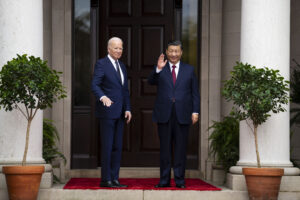What’s Really Happening With China’s Great Firewall
Three popular services that allow users in China to view otherwise-censored content have experienced outages over the past few days, a sign of increasing government efforts to limit what Chinese users can read on the Internet. Shutterstock
Shutterstock
By Sisi Wei, ProPublicaThis piece originally ran on ProPublica.
Three popular services that allow users in China to view otherwise-censored content have experienced outages over the past few days, a sign of increasing government efforts to limit what Chinese users can read on the Internet.
The companies, Golden Frog, Astrill and StrongVPN, which provide “Virtual Private Networks,” or VPNs, have all publicly acknowledged experiencing problems. The problems seem to affect students and personal users. It does not seem that large businesses have been affected. An employee working in the Chinese office of a large American financial firm confirmed to ProPublica that their corporate VPN still works.
Such VPN services were not previously the subject of blocking, and became popular ways for tech-savvy Chinese users, especially young people, to circumvent censorship.
Astrill’s message to customers specified that the VPN disruption is limited to iPhones and iPads, which are not as prevalent in China as they are in the U.S., and the Washington Post reported that Astrill’s service “still functions on laptops, albeit intermittently.”
According to Reuters, “Almost all foreign and many domestic companies in China use VPNs to conduct business relatively unimpeded by disruptions to web services. The services that have seen disruptions recently are widely used by individuals, largely affecting mobile devices.”
Last November, ProPublica began tracking whether the homepages of 18 international news organizations are accessible in China.
Censorship in China isn’t limited only to whether Chinese users can access foreign websites. It also dictates what they can and can’t say online, especially on websites owned by Chinese companies. In 2013, ProPublica published 527 user-posted images that were deleted by censors at Sina Weibo, China’s closest equivalent to Twitter. In an effort to discover what causes a user’s posts to be censored, ProPublica also found that the lives of users or their families were sometimes threatened because of material they had posted online.
More about the Great Firewall: Every day since Nov. 17, 2014, ProPublica has been testing whether the homepages of international news organizations are accessible to browsers inside China. See the results.
ProPublica is a Pulitzer Prize-winning investigative newsroom. Sign up for its newsletter.
Your support matters…Independent journalism is under threat and overshadowed by heavily funded mainstream media.
You can help level the playing field. Become a member.
Your tax-deductible contribution keeps us digging beneath the headlines to give you thought-provoking, investigative reporting and analysis that unearths what's really happening- without compromise.
Give today to support our courageous, independent journalists.






You need to be a supporter to comment.
There are currently no responses to this article.
Be the first to respond.